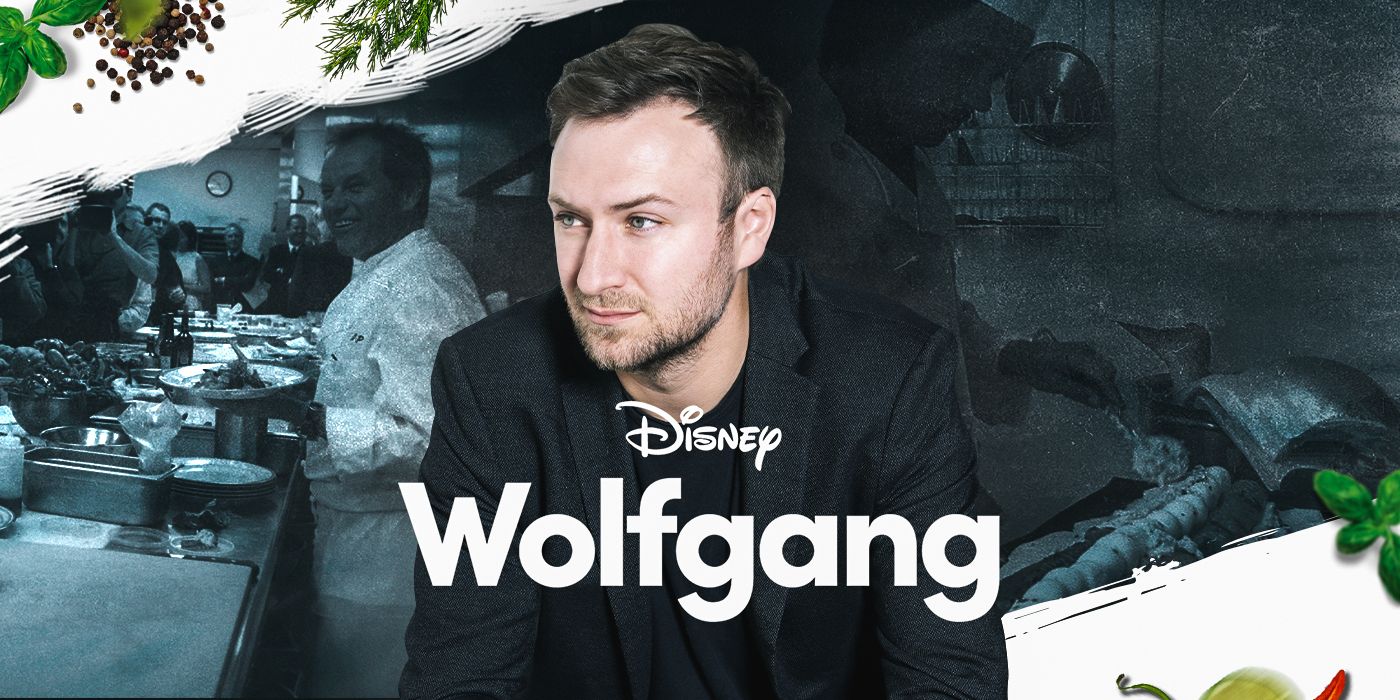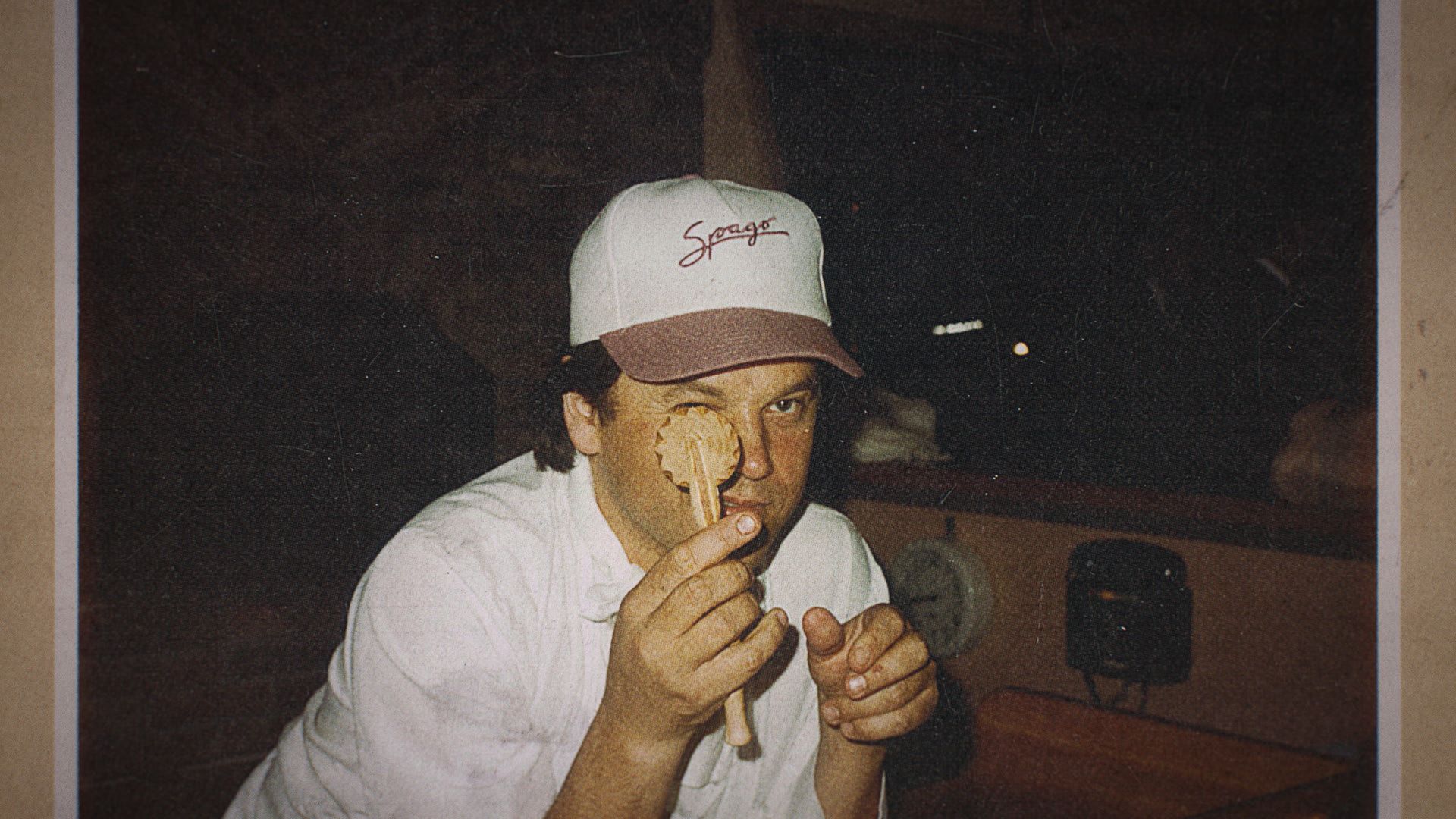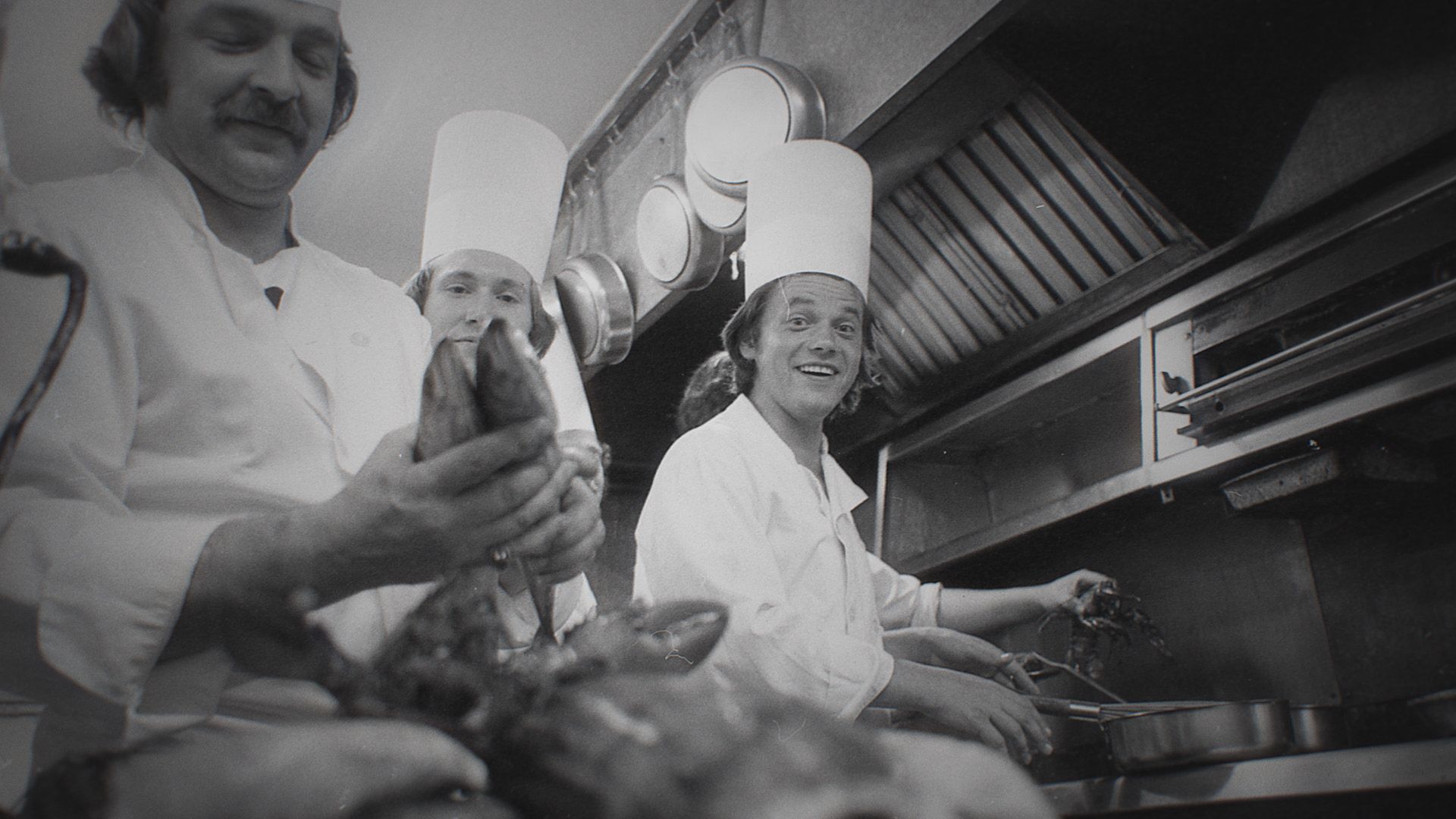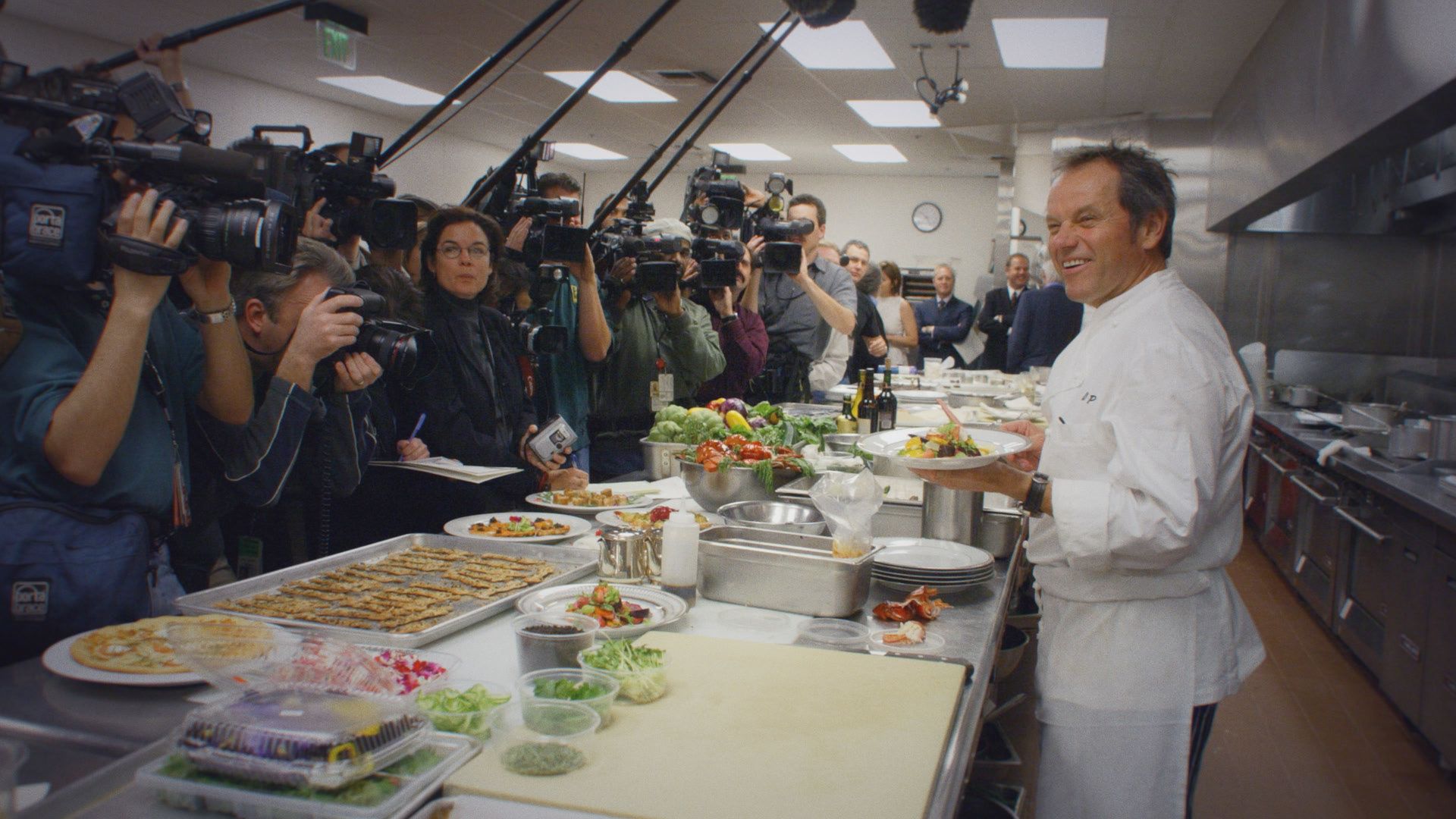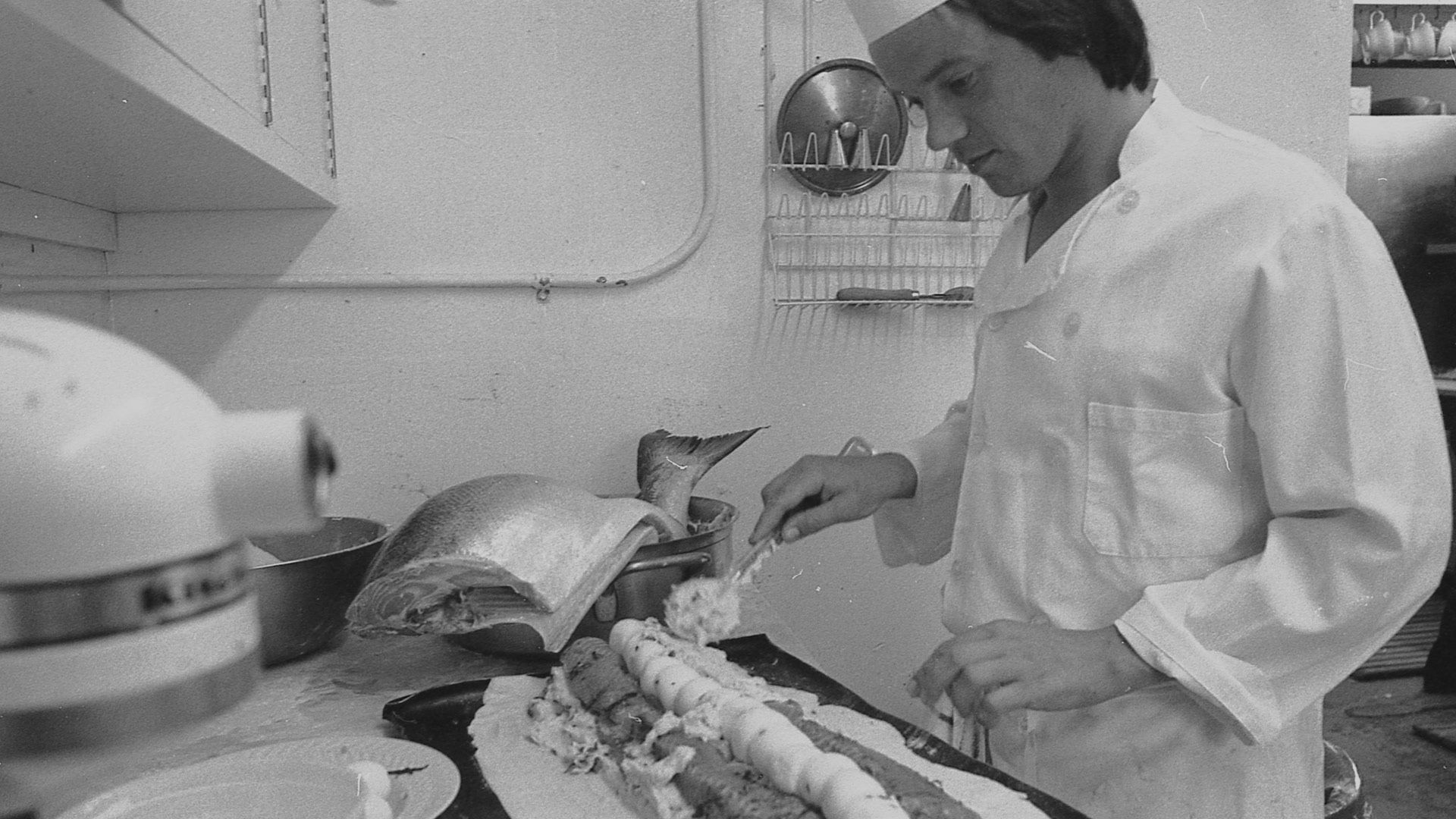David Gelb never intended to make documentaries. In fact, the filmmaker behind the Netflix docuseries Chef’s Table and the iconic Jiro Dreams of Sushi originally wanted to make big-budget movies. Which is why, as he revealed to me in a recent interview about his new documentary film Wolfgang, he worked as a production assistant on Sam Raimi’s Spider-Man 3. But while Gelb hasn’t yet made the leap to blockbusters, he brought the high production value and cinematic style of those kinds of films to the documentary medium, turning episodes of Chef’s Table into works of art all their own.
Gelb’s passion and respect for artists is no doubt part of what drew him to Wolfgang Puck, whom he approached about making a documentary that would tell the story of the famous chef’s origins and cement his legacy. What Gelb wasn’t entirely expecting, however, was for Puck to open up significantly about his abusive stepfather and troubled childhood, the trauma of which he no doubt carried with him when he moved to Los Angeles to make it as a chef.
The resulting film, Wolfgang, is both deeply personal and inspiring. Just as Gelb’s previous work does, Wolfgang takes an intimate approach to the life of its subject, and as we learn about Puck’s past, we come to greater understand his entire outlook on his life and career.
During my conversation with Gelb, we discussed how he convinced Puck to say yes to a documentary in the first place, and why getting him to open up about his past was always part of their plan for the film. He also talked about the R-rated stories they had to keep out of the film, digging through archival footage from Spago’s heyday in the 80s and 90s, and why Disney+ felt like the right fit for a documentary about Wolfgang Puck. Given Gelb’s connections to the food world, I also asked him about the current state of the industry as we’re heading out of the pandemic, and what quality unifies all the best chefs. And I couldn’t let Gelb go without asking for an update on more Chef’s Table and how he feels about the “Juan Likes Rice and Chicken” episode of Documentary Now.
Check out the full interview below. Wolfgang is now streaming on Disney+.
How do you convince Wolfgang Puck to let you make a documentary about his life?
DAVID GELB: Well, I had a lot of help. I was very fortunate first of all, that Wolfgang had watched Jiro Dreams of Sushi with his son. And he told me the story about how he watched it with this son, and they were both quite moved by it and Chef's Table, I think he had seen some episodes as well. And I know that his staff and the people around him were all aware of it and helped put in a good word for us. We had a number of meetings with Wolfgang. We were very candid about what we wanted to do, create something for him that really told the story of his origins and kind of cemented his legacy. Wolfgang often would talk about how people kind of take his success for granted or saying that, "Oh, he's just like a TV chef or who just made it so easily."
He wanted to set the record straight and show people he really went through a lot. He worked very hard. He overcame incredible adversity coming from real poverty, from an abusive home where his stepfather was quite abusive to him. And telling him that he could never make it. Nobody really knows that side of him. And so he was willing to go there. He was ready to go there finally. And there's a big part of the movie that's also about kind of reconciling with his past. One of the first things he says in the film was like, "I don't like to talk about the past." And of course that's what the entire movie is really about. So it was time I think, and in the process of making it, we brought him to Austria and we made him go and revisit all the sites of his childhood. To help him on this journey of reconciling with his past, remembering it, and then confronting it head on. And I think that he was game for it. He was ready to go.
How early on did you know that you wanted to delve into that aspect of his past? Was it part of the documentary before you guys started shooting or was that something that was found?
GELB: It was always part of our plan. I think that the details of it, a lot of it was surprising to us, about how bad it really was for him, because he had never really talked about it. He doesn't really like to talk about that stuff in interviews. He may have referenced his stepfather before in certain interviews about how he had a tough childhood, but the specifics of it were a revelation to us as well. And so they kind of grew in terms of the scale of the role that they take in the film.
What was his mood like at the end? You say you guys kind of guided him through this, at that wrap, after you guys got through kind of this cathartic moment, what was that like?
GELB: I mean, so much of what we did after filming was eating. Every night after we would wrap, we would go to a different Austrian restaurant where they would roll out the red carpet for him basically, and send out everything from the kitchen and we would have a big meal. And I think that that is sort of like the release to a certain extent is to enjoy these foods and doing it together. It's like it was a combination of his family and my crew kind of at all these dinners and stuff and building trust again and really just enjoying each other's company. So it's sort of like we're all friends, we kind of become this familial unit. And I think that that made him feel a lot more comfortable. But he was very generous and forthcoming and it couldn't have been easy for him.
I wanted to ask about the Spago footage, what you captured there. As you were making the documentary, were there any threads or storylines that you pulled out just because it didn't really fit in the documentary that you still found really fascinating, and would like people to know about?
GELB: Oh my God. I mean so much. And there's also a lot of really R-rated content that we chose not to include, but it was a scene. And it had everything that came along with it in the 80s and 90s and its celebrity culture. There was so much stuff. And the stuff that we didn't include, a lot of it was just because it wouldn't be the right thing for a documentary that we knew was going to be on Disney+. We tried to stay with the G-rated stuff, but a lot of stories about jockeying for tables. I mean, it was such a status symbol to have a regular table at Spago was a status symbol.
And Janice, who's the manager, was describing in her interview how they would read up on Hollywood Reporter to see who was more popular or who had lost a job or whatever it was. And then it was a real kind of power hierarchy. So there's a lot of conflicts between people showing up and being like, "Why are you at my table?" And these kinds of fights and things like that with breakout, not physical fights but a lot of yelling and stuff. And maybe occasionally weapons pulled, I don't know. But it was described. I mean, there's just so much. And the hardest part is deciding what stays in the movie. But we really just tried to make sure that the stories were focused, that I could link them back to the core story. And that if there is a story about a celebrity, that it would involve a lesson or something that Wolfgang learned from or something like that. And that was sort of our barometer. But there was a cut of this movie that was two and a half hours long and whittling that down was tough.
Well, to that end, one of the things that it made me nostalgic for was when you walk into a restaurant and people aren't all on their phones. It was just people packed together that were just shoulder to shoulder yelling at each other and all of that. That was just one aspect that I think was really striking.
GELB: Absolutely. And then you would have these various people who were the power agents or whatever, they weren't on their phones, but they would have phones with a long cable being brought out to their table and they would yell at people on the phone that way.
You say you knew it was being made for Disney+, and I know you have a relationship with Netflix, so I was curious what made Disney+ the right home for this project for you.
GELB: At the time, we had been doing a number of different projects at Disney+. I have a company called Supper Club and we've done a ton of work for Netflix. I love Disney IP. I love Marvel. I love Star Wars and Pixar and all these things. And so when they were starting up their platform, we got involved and tried to create kind of companion nonfiction pieces that would compliment their properties, which was exciting for me. So we were working on the show Marvel 616, which is our doc series on Disney+ about stories adjacent to Marvel comics. I did one about the Japanese Spider-Man television show, which is the episode I directed, which is really a lot of fun and I highly recommend it. So we were already working with them very closely and it just felt like Wolfgang's story, it feels like a Disney movie to me.
I mean, I compare it to Ratatouille a little bit in terms of the archetype. In Ratatouille, Remy comes from a place where his father was like, "Stay out of the kitchen. Don't do the thing that you love." And that's what Wolfgang's stepfather was telling him in a much harsher way. And so he relentlessly pursued his dream and refused to give up and made it through the circumstances of his own talent, a bit of luck and just incredible perseverance. And it just really felt like a Disney story to us.
Wolfgang is probably the most documented chef in all of history and the film touches a bit on his frozen pizza empire. I was curious if there was more that got into all that, because it seemed like he decided he wanted to kind of keep things more insular after that stopped I guess the early 2000s. Was there discussion of kind of delving a bit deeper into that aspect of his career?
GELB: Everything that we touch on, we could go on and on and on with. Frozen pizza to all his other products to soups in every home and a pressure cooker, a knife set. He has everything. He has his hands in everything related to the food world, but I didn't want to keep stacking accomplishment, over accomplishment, over accomplishment. I mean, we tried to really focus in on the things that were like the innovations that he made that were landmarks. So the idea of gourmet pizza that you can cook at home. And that's a really fun story connected with Johnny Carson who was inexplicably taking home piles of pizza and not eating them and Wolfgang is like, "Where are you taking my pizzas?" He's like, "I'm freezing them." So it's a great story. And so we use that as sort of emblematic how then of course it expanded, but we move on with the film.
You’ve made a career out of really delving deep into the lives of chefs and how that informs the kind of food that they cook and what the food means to them personally. And I was curious, having spent so much time with so many great chefs, do you feel there's a common quality that connects the best of the best?
GELB: I mean, passion is the unifying theme. It's passion and being a chef is one of the hardest jobs. It's one of the riskiest jobs. And these made for great stories. The great chefs are storytellers. They tell a story with their food. They have to present a narrative that gives a diner a reason to choose their restaurant amidst relentless competition. I mean, especially in the big cities. The turnover on these restaurants is rapid. If they don't hit it then they're gone. And then these chefs have to perform every night. Their team has to perform because one bad night... I mean, I'll just say, we make a movie, we get to edit it, we get to finesse it. We get to make this perfect presentation and it stays that way. And then we get to move on to the next thing. When a chef opens a restaurant, it's like a live show that goes on forever. And one bad night can ruin their reputation. And so that is a remarkable feat. So all these things come together to make chefs really fantastic characters to profile, but it is passion that is that unifying trait.
It's been a really rough year for everyone, but the restaurant industry in particular was hit hard. I'm curious with the people you're in contact with, what's kind of the tone or the vibe of the state of the restaurant industry at the moment?
GELB: Well, I mean, it was a massive valley. But now there's an opportunity to really grow. I mean, the demand to go out is huge now, especially in United States where we're very fortunate to have vaccinations readily available for anybody who wants it. And the rest of the world is trying to catch up. But I think now, here's one example, at Spago they opened this big outdoor pavilion because they couldn't use the inside of the restaurant. But now they're running at full capacity basically inside, or I think they're about to get to full capacity right now or in the coming days. And now they have that whole outdoor area and the inside and they're busier and busier than ever. And now they're just trying to recruit as many people as they can to try to train them, to become servers up to the level of what the customers at Spago demand. So it seems like there's a big opportunity. People want to eat out more than ever. And I feel the same way. I mean, we've all been cooped up for a long time and we want to go out and eat some good food.
I also have to ask you as a fan of Chef's Table, as productions are ramping up, is there more Chef's Table on the way?
GELB: Yeah, I mean, I can't really give any more specifics, but we have not been able to shoot internationally. And so we are eager to get going and get our teams back to work as soon as possible on both Chef's Table and Street Food.
I also have to ask as a fan of documentaries and Documentary Now, have you seen the Juan Likes Rice and Chicken episode?
GELB: Of course. I mean, being featured on Documentary Now amongst the most iconic documentaries in the world and being parodied with such love and care, I actually consider that to be the greatest professional accomplishment of my life. I'm not making up, having made something that people care enough about to parody is an incredible honor. And it's great. I mean, I thought it was hilarious and I thought the story was actually quite touching.
Oh, it's great. It's fantastic.
GELB: Yeah. So I watched it and I loved it. And in the process of making it, their team reached out to our cinematographer and tried to figure out how did you shoot it exactly because they really wanted to be very faithful. And so, I love that show and I think that Fred Armisen honestly is like a genius and Bill Hader as well who was in it. I thought it was amazing.
One of the things your work is known for is really kind of stunning, beautiful cinematography. You have a credit on your resume as a production assistant on Spider-Man 3, where you're working with Sam Raimi and Bill Pope. What do you remember from that experience?
GELB: (Laughs) I remember delivering Sam Raimi his lunch and never really getting to talk to him. But I was there because I always wanted to do big movies. That was always my goal. So my goal when I was in college and stuff, I never thought that I was going to be a documentarian. I wanted to do what Sam Raimi and Bill Pope were doing. And so instead, what I ended up doing, I guess, is taking kind of the production values of big movies and bringing them to documentary, or being part of that, along with Planet Earth or Errol Morris, who always has had stunning, really interesting cinematography in his films. I wanted to bring that to what I was doing.
And I felt like food television always looked like a reality show. The angles, there was no artistry to it. And I wanted to bring that when I was making Jiro Dreams of Sushi because the chef I felt like he was a real artist. He was caring about every single element of the directions of the grains of rice. I mean, everything that he was doing was so meticulous that we wanted to bring all of the elements of cinema up to that level. And we approach it in terms of shooting it like we're doing a scripted movie or anything else. And for Wolfgang, we took it a step further where we're actually shooting with anamorphic lenses in a much wider aspect ratio than we have done before, more so than on Jiro Dreams of Sushi and on Chef's Table using really, kind of beautiful cinematic lenses that flare in these beautiful ways that bring even more texture and kind of cinema to it. Because it really is a movie.
And also people are going to be watching this on Disney+. Some people are going to be watching this who have never seen a documentary that wasn't a nature documentary. That's the kind of non-fiction stuff you see on Disney+it's kind of behind the scenes or kind of some kind of reality things like Encore. But a true bio doc, this may be the first for some people and we really wanted them to feel at home like they're watching a Disney movie with that level of production value in storytelling.
Well, it looks great. And maybe Sam Reimi is available for an episode of Chef's Table coming up.
GELB: I mean, what an honor that would be.
Wolfgang is now streaming exclusively on Disney+

